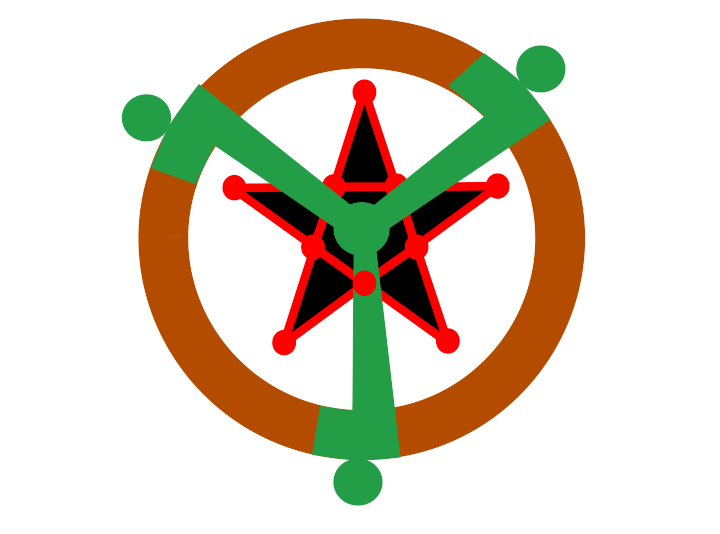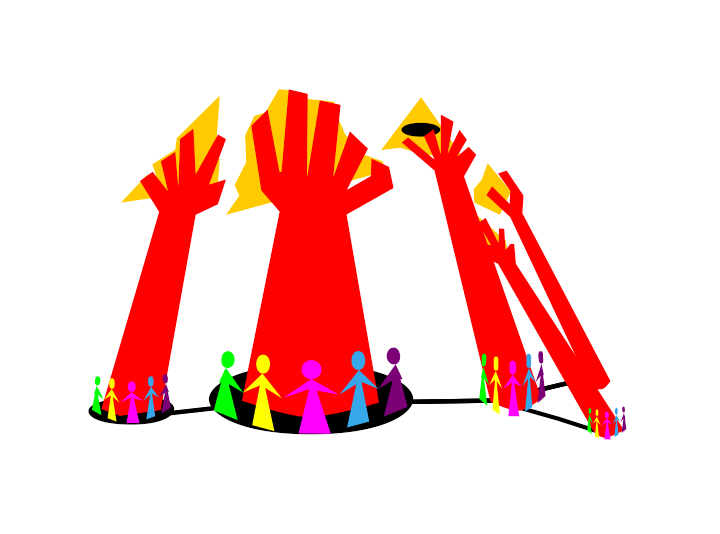Table of Contents
Social Ecology and Communalism
 Communalism is a system of government in which virtually autonomous local communities are brought together in a confederation under the principles and practice of communal ownership. Social Ecology is its recognition of the often-overlooked fact that nearly all our present ecological problems arise from deep-seated social problems.
Communalism is a system of government in which virtually autonomous local communities are brought together in a confederation under the principles and practice of communal ownership. Social Ecology is its recognition of the often-overlooked fact that nearly all our present ecological problems arise from deep-seated social problems.
- Social Ecology and Communalism - Murray Bookchin
- Remaking Society: Pathways to a Green Future - Murray Bookchin
- The Ecology of Freedom - Murray Bookchin (Audiobook)
- Communalism: A Liberatory Alternative - Marcus & Stephanie Amargi (Audiobook)
- Toward a Communalist Approach - Murray Bookchin
Dialectical Naturalism
 Dialectical naturalism is the philosophical underpinning of social ecology. Through dialectical naturalism we reason the evolutionary becoming of the biological world or “first nature”, the emergence of the realm of culture or “second nature”, and the potentiality for “free nature”—a rational and ecological society.
Dialectical naturalism is the philosophical underpinning of social ecology. Through dialectical naturalism we reason the evolutionary becoming of the biological world or “first nature”, the emergence of the realm of culture or “second nature”, and the potentiality for “free nature”—a rational and ecological society.
- The Philosophy of Social Ecology: Essays on Dialectical Naturalism - Murray Bookchin
- The Trouble with Wilderness; or, Getting Back to the Wrong Nature - William Cronon (Audiobook)
- Institute for Social Ecology Class - 1988 (YouTube) - Murray Bookchin
- Second Nature Lecture - 1996 (YouTube) - Murray Bookchin
The History of Hierarchy
 From dialectical analysis we can deduce a history of hierarchy, which traces the emergence of hierarchy from the rise of government by elders, the emergence of patriarchy, shamanistic guilds, warrior groups, chiefdoms, and eventually the state.
From dialectical analysis we can deduce a history of hierarchy, which traces the emergence of hierarchy from the rise of government by elders, the emergence of patriarchy, shamanistic guilds, warrior groups, chiefdoms, and eventually the state.
- The Murray Bookchin Reader - Murray Bookchin & Janet Biehl (Audiobook)
- Cities Against Centralization - Greg Bryant
- Sociobiology or Social Ecology - Murray Bookchin
- Debt: The First 5000 Years - David Graeber (Audiobook)
- Worshipping Power - Peter Gelderloos
- People Without Government: An Anthropology of Anarchy - Harold Barclay
- Advanced Concepts Class - 1996 (YouTube) - Murray Bookchin
Ecological Critique
 With history for evidence, an ecological critique finds that the idea of dominating nature emerges from the domination of human by human. Economic, ethnic, cultural, and gender conflicts, among many others, lie at the core of the most serious ecological problems we face today. Minimally, an ecological society must eliminate the domination of human by human.
With history for evidence, an ecological critique finds that the idea of dominating nature emerges from the domination of human by human. Economic, ethnic, cultural, and gender conflicts, among many others, lie at the core of the most serious ecological problems we face today. Minimally, an ecological society must eliminate the domination of human by human.
- Death of a Small Planet - Murray Bookchin
- Will Ecology become 'The Dismal Science'? - Murray Bookchin
- Intelligentsia and the New Intellectuals - Murray Bookchin
- Social Ecology versus Deep Ecology - Murray Bookchin
- The Population Myth - Murray Bookchin
- Rethinking Ecofeminist Politics - Janet Biehl
- Liberating Life: Woman's Revolution - Abdullah Öcalan
- Ambiguities of Animal Rights - Peter Staudenmaier
- Ecofascism: Lessons from the German Experience - Janet Biehl & Peter Staudenmaier
- The Ecology of Everyday Life - Chaia Heller
- Art as Politics - Adam Krause
- The Revolution Will Be Hilarious - Adam Krause
- Toward Climate Justice - Brian Tokar
- Waterloo Lecture - 1985 (YouTube) - Murray Bookchin
Libertarian Municipalism
 We develop a political strategy, from ecological critique, for a libertarian municipalist society - organised as a confederation of directly democratic municipal assemblies, production would be municipalised and brought under the control of the assemblies, and the market economy would be replaced with a moral economy.
We develop a political strategy, from ecological critique, for a libertarian municipalist society - organised as a confederation of directly democratic municipal assemblies, production would be municipalised and brought under the control of the assemblies, and the market economy would be replaced with a moral economy.
- Urbanization Without Cities: The Rise and Decline of Citizenship - Murray Bookchin
- The Next Revolution: Popular Assemblies & The Promise of Direct Democracy - Murray Bookchin (Audiobook)
- Democratic Confederalism - Abdullah Öcalan (Audiobook)
- Democratic Nation - Abdullah Öcalan
- Libertarian Municipalism: An Overview - Murray Bookchin
- The Left That Was: A Personal Reflection - Murray Bookchin
- Thoughts on Libertarian Municipalism - Murray Bookchin
- The Politics of Social Ecology: Libertarian Municipalism - Janet Biehl (Audiobook)
- Neighborhood Power: The New Localism - David Morris & Karl Hess
- A Politics for the 99% - Marco Rosaire Conrad-Rossi
- Forms of Freedom Talk - 1985 (YouTube) - Murray Bookchin
Utopian Vision
 Seeking to reconstruct society both physically and institutionally, this utopianism includes practical experiments and alternative technology.
Seeking to reconstruct society both physically and institutionally, this utopianism includes practical experiments and alternative technology.
- The Anthropology of Utopia - Dan Chodorkoff
- Institute for Social Ecology Interview - 2012 (YouTube) - Dan Chodorkoff